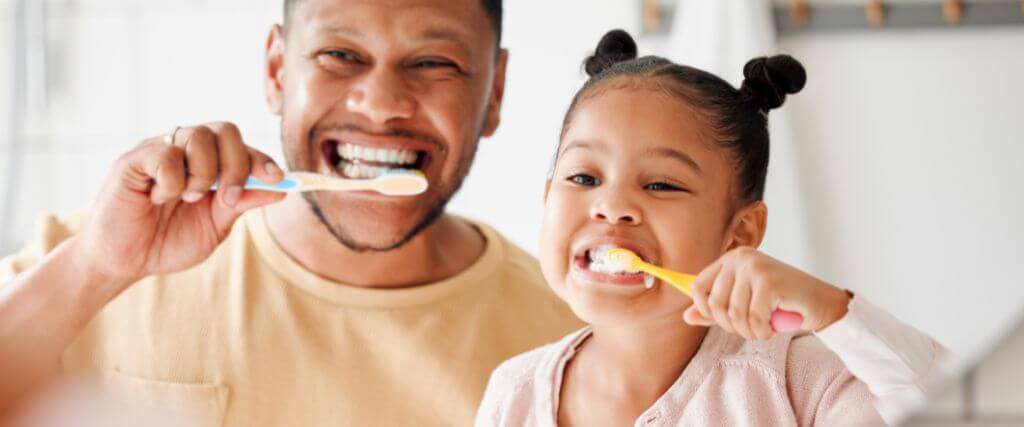As a parent, you know that establishing good oral hygiene habits early is crucial for your child’s long-term dental health. However, getting children excited about brushing their teeth and caring for their oral health can be quite a challenge. As dental professionals, we understand and are here to help! In this article, we’ll explore fun ways to teach kids about dental hygiene and make it an enjoyable part of their routine rather than a chore.
Starting Early: Dental Care for Infants and Toddlers
The journey to excellent oral health begins even before the first tooth appears. For infants, parents can gently wipe the gums with a soft, damp cloth after feedings. This cleans the mouth and gets the baby accustomed to having their mouth cleaned.
When the first tooth emerges, typically around four to seven months of age, it’s time to introduce a small, soft-bristled toothbrush. At this stage, use only a tiny amount of fluoride toothpaste—about the size of a grain of rice. As children grow and learn to spit, usually around age 3, increase the amount to a pea-sized drop.
Making brushing a part of the daily routine is the key to instilling good oral hygiene habits in toddlers. Try incorporating it into your morning and bedtime rituals, and make it fun by singing a special toothbrushing song or telling a short story while brushing. This helps create positive associations with oral care from an early age.
.jpg)
Creative Approaches to Make Brushing Fun for Young Children
As kids get older, keeping them engaged in their oral hygiene routine becomes even more important. A simple yet effective way to encourage brushing is to let them pick out their own toothbrush. Many brands offer bright colors and fun designs featuring favorite cartoon characters, turning brushing time into something they look forward to.
You can also make brushing feel like a game. Pretend the toothbrush is a train traveling to clean each “station” in the mouth, or challenge your child to brush in small circles while you count to 10 for each section. Turning brushing into a playful activity helps children develop healthy habits without it feeling like a chore.
Technology offers additional support for keeping kids motivated. Many interactive brushing apps feature timers, music, animations, and even rewards for consistency. Some smart toothbrushes sync with these apps to provide real-time feedback, making brushing both educational and entertaining.
Parents as Oral Hygiene Role Models
Children often learn best by example, and oral hygiene is no exception. When parents demonstrate proper brushing techniques and maintain their own oral health routines, children are more likely to follow suit. Try making brushing a family activity. Brush together in the morning and before bed to show your kids that oral care is important for everyone.
Remember to praise your children’s efforts and celebrate their commitment to oral health. Small rewards, like stickers on a brushing chart, provide positive reinforcement and motivation.
Beyond Brushing: Comprehensive Oral Care for Kids
While brushing is the cornerstone of good oral hygiene, teaching children about comprehensive dental care is important. Flossing, for example, is crucial for removing food particles and plaque stuck between their teeth where a toothbrush can’t reach. Make flossing fun by using colorful floss picks or creating a game where you “fish” for plaque between teeth.
Diet impacts dental health, as well. Teach children about tooth-friendly foods like crunchy fruits and vegetables, which help clean teeth naturally. Explain how sugary and acidic foods can harm teeth, and encourage healthy snacking habits.
Regular dental check-ups are also essential. Familiarize your child with the idea of visiting the dentist early on. Many pediatric dental offices are designed with kids in mind and feature colorful decor and fun distractions. Make visiting the dentist fun when your child is young, and they’re less likely to develop fear or aversion to dental care.
Addressing Common Challenges
Even with consistent encouragement, some children may still resist brushing or feel nervous about visiting the dentist. If your child avoids brushing, try to uncover the underlying reason. The toothpaste might be too strong, or the toothbrush could feel uncomfortable. Making small adjustments—like switching to a milder toothpaste or a softer brush—can often solve the problem.
For children who fear dental visits, preparation can make a big difference. Reading picture books or watching friendly videos about dental checkups helps explain what to expect and eases anxiety. Since much of a child’s fear comes from uncertainty, familiarizing them with the process can build comfort and confidence.
Additionally, habits like thumb-sucking or prolonged pacifier use can impact proper dental development. Gently encouraging your child to stop—and celebrating their progress—can help break these habits over time. If they persist, your child’s dentist or pediatrician can provide guidance and support.
.jpg)
Educational Resources and Tools
Fortunately, numerous resources are available to help educate children about oral health. Many children’s books tackle the subject of dental hygiene in fun, accessible ways. Videos featuring favorite characters discussing the importance of brushing can also be impactful.
Interactive learning materials, such as tooth models or play dental kits, teach kids more about their teeth and how to care for them. In addition, some dental offices and community health centers offer educational programs for kids and families.
The Long-Term Benefits of Good Oral Hygiene
As dental professionals, we know that the advantages of good oral hygiene go well beyond a bright, attractive smile. Consistent dental care helps prevent cavities, gum disease, and other oral health issues that can impact overall physical health. A healthy smile also supports self-confidence and contributes positively to emotional well-being.
Encouraging good habits early gives your child a strong foundation for lifelong oral health. The routines and knowledge they build now can protect them from discomfort and costly dental procedures in the future, setting them up for a lifetime of healthy, confident smiles.
Conclusion
Teaching children about dental hygiene doesn’t have to be a chore. Incorporating fun, creativity, and positive reinforcement into oral care routines can help your kids develop lifelong habits that will benefit their well-being. As dental professionals, our role extends beyond the clinic. We have the opportunity to empower parents and caregivers with the tools and knowledge to make dental hygiene an enjoyable part of family life.
Every smile tells a story. By helping your children develop good oral hygiene from a young age, you’re helping to ensure that their stories are filled with healthy, confident smiles for years to come!

